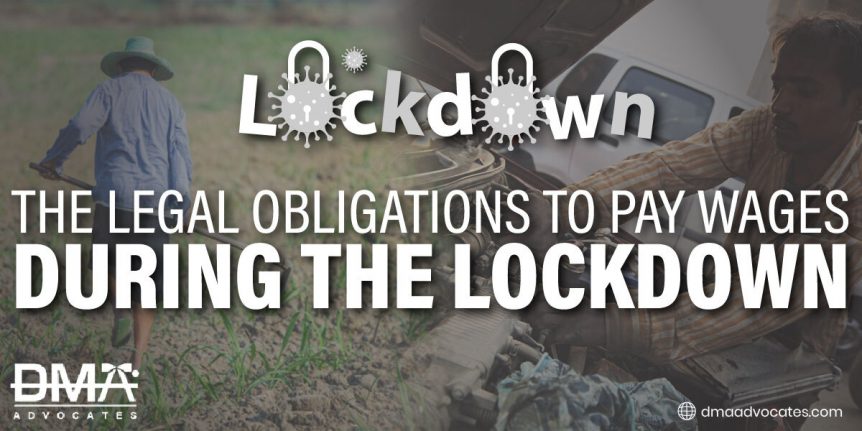In the present pandemic scenario there is a major question which requires attention is the payment of wages to the employees by the employers when the employer himself is bereft in doing the business being done.
There is no doubt that the announced national closure caused great discouragement to workers, employers and employees, and the financial difficulties caused to Workers, employees and employers in various sectors. The Covid-19 pandemic caused many employees to wonder if they would receive a pay during the national shutdown period. Similarly, employers are placed in a legal conundrum as to whether there is a legal obligation to pay wages / salaries in circumstances where employees have not worked during the lockout period. So what is the legal position?
Given this pandemic situation of the Covid 19, the government issued a notice stating that employers had to pay wages during the blockade/lockdown. The central government ordered all states to require employers in all industries, stores, and establishments to pay their workers without deductions during the lockout period. States have published their own versions of this directive. Both relied on the Epidemic Diseases Act of 1987 or the Disaster Management Act of 2005 to educate the private sector.
The Central government and State governments of India have asked employers to pay wages during the layoff period, not only for permanent workers in an industrial establishment, but also to hire interstate migrant employees and workers. For humanitarian reasons, there cannot be two opinions on the need to pay employees’ wages. However, it must be asked whether this obligation should be that of private employers or that of the State.
Disaster management has been defined as an ongoing process of planning and implementing the measures necessary to mitigate or reduce the risk of disaster, its severity or its consequences. This is perhaps the widest text here that lawyers say the government has entrusted to instruct employers.
The Epidemic Diseases Act was enacted in 1897 to prevent the spread of bubonic plague in then Bombay now Mumbai. The purpose of the law is to prevent the spread of epidemic diseases. By law, central and state governments have the power to take steps to control the epidemic. Article 2 of the law grants States the following special powers: Take measures and, through a public notice, prescribe temporary regulations to be observed by the public or by any person or category of people that it deems necessary. To prevent the appearance of this disease or its spread and can determine how and who will cover the costs incurred.
The substantive part of the law is section 2 and only allows the government to prescribe measures to prevent the appearance of this disease or its spread. It certainly does not give the government the power to order a private employer to pay wages.
These are the two points on which governments have issued guidelines. Given the provisions of the laws and the wording of the articles discussed above, no legislative provision supports the guidelines of the central or state government regarding the payment of wages.
The only reason for the GOI order is the economic hardship of migrant workers, but the possible substantive legal order required wages to be paid to all employees, not just migrant workers. Furthermore, although the ordinance requires landlords not to collect rent during the lockdown.

It directs employers to pay full wages “for the period” during which establishments are closed during closure.
Ministry of Home Affairs issued Order No. 40-3/2020-DM-I(A) dated 29th March 2020; wherein it was stated in Clause iii that;
All the employers, be it in the industry or in the shops and commercial establishments, shall make payment of wages of their workers, at their workplaces, on the due date, without any deduction, for the period their establishments are under closure during the lockdown;
It is further directed that in case of violation of the above measures, the respective State/ UT Government, shall take necessary action under the Act. The DM/DC and Senior SP/SP/ DCP will be personally liable for implementation of the above directions and lockdown measures issued under the above-mentioned orders.
Undersigned by the Home Secretary on 29/03/2020
Further, Order from The Principal Secretary to Govt of Haryana, Labour Department vide No. 7047-7127 dated 25th March 2020 being Necessary advisory to the employers/ owners of Private Establishments in the State of Haryana for not terminating the services of their employees or reduce their wages in view of outbreak of COVID-19 pandemic.
The notice indicates that if a worker takes leave, he must be considered to be on duty, without deduction of wages. This, the government warned, would worsen the crisis.
The dismissal of a worker or the reduction of wages in this scenario would further aggravate the crises and not only weaken the financial situation of the employee, but would also damage his morale to fight against this epidemic.
While these are good legal issues that require the attention of legislators, human values and standards will mean that the order can be interpreted liberally to pay wages and salaries to everyone. But as also observed by Ministry of Corporate Affairs it can be more of a humanitarian consideration and cannot be a legal obligation.
But it has to be seen that humanitarian consideration also depends on the circumstances of each individual but if it can be super imposed on every person or an entity against their will without there being any mechanism to address the grievance of the employees and industries without looking into the aspect of “quid pro quo”.


